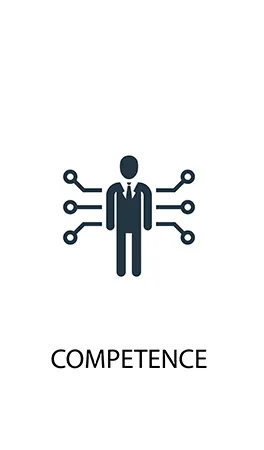Business Skills
What are Interpersonal Skills? 19 Examples of Interpersonal Skills
Whether you’ve remained in the same employment field for years or hopped around, you’ve most certainly built multiple skill sets and contributed to your repertoire of skills. But, of course, not all of these are interpersonal. So, what are interpersonal skills? Often referred to as people skills, social skills, soft skills or life skills, they are the skills to communicate with and develop connections with others.
Interpersonal skills combine your natural personality features and how you’ve learned to deal with specific social settings. Practical interpersonal skills can benefit you during the job interview process and help you develop your career.
Furthermore, those with excellent interpersonal skills are more likely to work successfully with others, formally and informally, including in teams or groups. They efficiently communicate with others, whether they are family, friends, colleagues, customers, or clients. They also have stronger home and business relationships.
Let’s get into more specifics about these interpersonal skills.
Table of Content
What are Interpersonal Skills?
Even if you aren’t aware of the definition of interpersonal skills, you communicate using them daily without realising them. Essentially, these are how people exchange ideas, information, feelings, and intent. We display interpersonal skills whenever we interact with others, and they determine our ability to form connections and collaborate with others.
Strong interpersonal skills can help you perform effectively in interviews and develop productive, long-term relationships in both your personal and professional life.
Before we get into some instances of interpersonal skills, we should understand why they are so important in both personal and professional life.
 Are you looking for an Advanced Persuasion Training course?
Are you looking for an Advanced Persuasion Training course?
Why Interpersonal Skills Are Important
Interpersonal skills are crucial for interacting and collaborating with groups and individuals in your personal and professional lives. People with high interpersonal skills are more likely to form positive relationships and collaborate effectively with others. They have a good understanding of family, friends, coworkers, and clientele. People frequently appreciate working with coworkers who have strong interpersonal skills.
Another advantage of interpersonal skills is the capacity to solve difficulties and make wise decisions. For example, you can use interpersonal communication skills and an understanding of others to find the most effective solution or make the best decision for everyone concerned.
In the professional sector, strong interpersonal skills will aid you throughout the job interview process as interviewers search for people who can work well with others. They will also help you succeed in practically any job by assisting you in understanding other people and modifying your approach to collaborate effectively. Good leaders are proficient as well as well-versed at evaluating interpersonal skills.
For example, while a software engineer may spend most of their time working on code alone, they may need to interact with other programmers to bring a product to market successfully. This is especially true as more businesses use cooperative agile frameworks for completing tasks.
So, employers will be searching for employees who can do technical jobs efficiently and communicate effectively with coworkers. People with interpersonal skills become good leaders because of their ability to interact with and motivate those around them.
Now, if you’re clear on “What are interpersonal skills?”, let’s explore some of them that are must-have.

Energy Healing – Flower Remedies at QLS Level 5
This extensive energy healing – flower remedies course is suitable for those who want in-depth knowledge of flower remedies and rescue remedies, chakras, and astrological signs. It is ideal for those who wish to pursue their career in energy healing – flower remedies.
19 Must Have Interpersonal Skills
Interpersonal Skills at Work (As an Employee)
Some of the interpersonal abilities that employers expect from their employees are listed below. They are as follows:
Self-confidence
Good interpersonal skills begin with the individual. No one will believe you’re good at your profession unless you think it yourself. To be successful, you must be self-confident at all stages of your career.
It will enhance how others see you, your ideas, and opinions. Being self-assured can also help you advance in your work since it will give you the guts to pursue your dreams.
Communication
One of the most important talents that companies look for is strong communication as a job applicant. They’ll be seeking people who can actively listen and explain information with clarity and rationale and understand how to customise their language to the people with whom they’re communicating. Good communication skills are also the foundation for other abilities such as teamwork and empathy.
Your ability to talk confidently and suitably for the context can aid in good communication with others. Pick up the appropriate tone and vocabulary for your audience.
For example,
- When attempting to explain something or speaking with clients, talk officially and professionally during meetings and presentations.
- Avoid using advanced or technical language when clarifying something or asking questions.
Empathy
Empathy is a valuable skill to have in the job since it demonstrates your capacity to
- Understand your teammates and their emotions.
- Support them with compassion and understanding.
Collaboration
Even for positions that require primarily independent tasks, it is critical to demonstrate to employers that you can interact with others. Working as part of a team entails-
- Listening to others’ needs
- Expressing your aims
- Resolving any problems that arise
A cohesive team is capable of generating new ideas and functioning efficiently.
Negotiation
Some occupations, such as being a salesperson or a realtor, require negotiation abilities. However, being able to negotiate is a valuable talent to have in any career. To be a great negotiator,
- You must be a good listener,
- Communicator, and
- Understand when to compromise, so that a solution that works for all parties involved may be reached.
Respect
There will be people in any workplace you do not connect with or whose beliefs you do not share. However, regardless of your differences, it is always necessary to show others respect. Respectful colleagues-
- Communicate more effectively
- Have fewer disputes
- Are happier
- More productive
Active Listening
Active listening entails listening to people with the intent of obtaining information and engaging with the speaker. While conversing with others, active listeners avoid distracting behaviours. This includes-
- Putting aside or closing laptops or mobile devices while listening
- Asking and answering questions when they arise
Dependability
Dependable people can be trusted in any situation. This might range from being punctual to maintaining commitments. Furthermore, employers place a great value on trustworthy employees and entrust them with key jobs and responsibilities.
Leadership
Even if you’re not a boss, having some leadership skills is essential. Leadership is a prime interpersonal skill that entails making sound decisions. Influential leaders need many other interpersonal qualities to make decisions, such as empathy and patience. Managers and individual contributors can both benefit from leadership qualities. In addition, employers admire people who take ownership of common goals in any capacity.
Teamwork
In any industry, working as a team is extremely valuable. Teamwork necessitates a wide range of interpersonal skills, including
- Communication,
- Active listening,
- Adaptability, and
- Responsibility.
Good “team players” are frequently assigned crucial assignments at work and may be considered ideal prospects for advancement.
Positive Outlook
Positivity spreads and fosters a harmonious working environment. Having a positive attitude, especially under challenging situations, makes duties easier and increases your chances of encouraging others and boosting morale.
Avoid making unfavourable comments about either your present or prior employment. Gossip spreads quickly. If you dish it out too much, you may become its victim.
Receptivity to Feedback
“If you are the smartest person in the room, you are in the wrong room,”
-Confucius
To be better in your career, you must be open to receiving comments; this allows you to grow. An egotistical or untrainable employee is likewise undesirable. To excel in your job,
- You must suppress your ego
- Focus on the objective criteria
Don’t think about your reaction to advice; just listen to it. Feedback is an effective tool for improving your performance and productivity.
Interpersonal Skills at Work (Managerial Role)
Interpersonal skills are even more crucial as a manager because you must be a good leader for your team, but your actions will also impact organisational growth.
To take things a step further, here are some interpersonal skills that will assist you in becoming a great manager.
Communication Through Language
To begin with, this is an obvious one, but it is likely one of the most crucial because it is critical while managing a team. Therefore, you must speak eloquently and to the point while remaining mindful of your surroundings.
When you speak,
- Be conscious of the words you use,
- Be mindful of your audience because everyone has a distinct communication style,
- And ensure your message is adequately understood.
Nonverbal Communication
Although verbal communication is necessary, research shows that most communication is nonverbal. Focus on your body language, eye contact, and tone to improve your skill and become a better manager. Being engaged means,
- Taking a confident stance,
- Making pleasant gestures,
- Nodding in agreement,
- And smiling
The individual with whom you are interacting will notice. They’ll know how you feel if you appear disinterested or grit your teeth. However, if you use good body language and indicate that you’re interested, your employees will be more likely to rely on you.
Ability to Listen
Only speaking is half the battle. To demonstrate their dependability, effective managers must also have excellent listening skills. If you have this, you will be more efficient, acquire information more effectively, and apply it. Excellent listening skills can help you avoid mistakes in a one-on-one scenario or a team gathering.
It can also lead to increased empathy and the development of stronger relationships. For example, the better you listen, the more likely your team will approach you with ideas and problems. In the grand scheme of things, it benefits the entire organisation by fostering a far stronger culture.
Problem-Solving
As a manager, you will constantly be confronted with new difficulties that you must resolve. It’s a necessary ability for any leader to have, especially if it has a more significant impact on the organisation.
Being a skilled problem solver also requires a variety of additional talents, such as
- Remaining calm to cope with the situation
- And keep the ball rolling, meaning, making sure that no hurdle hampers the workflow.
Assertiveness
This does not imply that you must act like a dictator; instead, you must express yourself while respecting your team. It’s so they know they have a dependable, trustworthy manager in charge of the ship.
The key to being assertive and retaining respect as a boss is-
- To be firm when necessary
- And remain polite at all times.
Building Trust
Trust is essential between you and your team and between you and your subordinates. It is how your company will be successful. Although your team may already have faith in you, it is equally crucial to gain and maintain that trust.
Your comments will have a far more significant impact as a trustworthy boss who demonstrates empathy, and you will have a close-knit group of employees who rely on you. However, you must also show that you trust them.
Leadership
To be an effective manager, you must be a trustworthy leader. It’s a trait that necessitates a variety of other abilities, including
- Positivism,
- Confidence,
- Empathy,
- Problem-solving,
- Listening,
- Communication,
- And more.
It demonstrates to the larger organisation that you are a motivated individual who can encourage others and take control to complete projects.
Interpersonal Skills at Home
You can interact more effectively with family and friends if you have good interpersonal skills. These skills are always transferable, meaning that, if you develop them for one role, you can always use them in other places, even in your personal life.
This will most likely be essential with your partner. For example, providing and accepting feedback from your spouse can successfully help resolve minor issues between you before they become major issues.
In this section, several of the previously described interpersonal skills have been added, as well as some new abilities for maintaining a happy and healthy relationship at home. The following are the main overall points:
- Honesty
- Positivity
- Humility
- Good listening skill
- Mindfulness
Top Courses of this Category
How to Develop Interpersonal Skills?
You may improve your interpersonal skills by practising appropriate communication and setting improvement goals. Consider the following suggestions to improve your interpersonal skills:
- Determine which aspects of interpersonal communication you can improve by soliciting input from coworkers, bosses, family, and friends.
- Observe coworkers, company leaders, and professionals you respect and admire to learn practical interpersonal skills.
- Learn to manage your emotions.
- Keep notes or a journal of your workplace chats and interactions so you can learn how to handle or communicate better.
- Practice your skills.
- Acknowledge others.
- Avoid distractions.
- Enrol in workshops or courses to help you enhance your interpersonal skills.
- Ask someone you respect or admire to assist you in improving your interpersonal skills.
- Tape yourself speaking with a video or voice recorder, then review or listen to it to see where you might enhance your communication abilities.
FAQs
What are interpersonal skills in social work?
Empathy, active listening, critical thinking, organisation, communication, and patience- are among the top interpersonal skills that you’ll need in social work.
How do you explain interpersonal skills in an interview?
Focus on your communication skills, conflict resolution skills and teamwork skills. Employers will more than likely start considering you if you can show competency in these.
What’s another word for interpersonal skills?
Interpersonal skills are often known as people skills, soft skills, or emotional intelligence.
Why are interpersonal skills important?
Interpersonal skills are necessary for talking and collaborating with groups and individuals in both your personal and professional lives. People with strong interpersonal skills are more likely to build relationships that are positive and collaborate effectively with others.
How to improve communication skills in the workplace?
Before working on other skills, work on your listening skill. It’s a basic necessity. Start with it and as soon as you’re proficient in it, you’ll start realising what other communication skills you lack.
Conclusion
In short, it is critical for whatever role you play in your life that the question “what are interpersonal skills?” is never alien to you. Whether you are a manager, an employee, a family member, or a friend, know them by heart and practise them to construct a solid and positive version of yourself everywhere. This blog, hopefully, has covered everything you need to know about interpersonal skills.
What to Read Next:
- What is Distributed Leadership? Importance of Distributed Leadership
- How to Write a Personal Development Plan
- 20 Jobs to Consider if you have Good Communication Skills – Details and Overview
- What are the Key Features of Effective Communication? 7C’s of Communication















